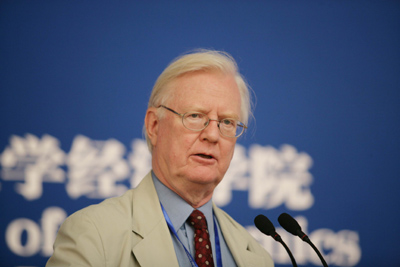China should raise its general tax levels to finance its expanding
welfare and public expenditure, according to a Nobel laureate.

James Mirrlees, who won the Nobel
Prize for economics in 1996, urges China to raise its general tax levels
to finance its expanding welfare and public expenditure.
[File] |
James Mirrlees, who won the Nobel Prize for economics in 1996, also said
China still has room for further growth.
The increasing need for more spending in areas such as social security,
healthcare and education "will mean that much more tax revenue has to be
raised," said Mirrlees, who is famous for his theory on optimal taxation, in an
interview with China Daily.
The Cambridge University professor was in Beijing to attend a recent
conference on China's public finance organized by Peking University's School of
Economics.
China's taxes are currently equivalent to 25 per cent of its gross domestic
product, and that is not necessarily high, Mirrlees said.
He said he is in favour of cash subsidies for low-income earners in addition
to other government-funded public spending in areas such as education and
healthcare.
But management must be strict if cash subsidies are involved as the potential
for corruption increases, Mirrlees said.
He also said that China should raise its threshold for personal income tax,
which last year was raised to 1,600 yuan (US$200) from 1,200 yuan (US$150), and
impose higher income tax on middle-income earners.
"The exemption level is quite low. That should be higher," Mirrlees said.
China now has progressive rates for personal income tax, ranging from 5 per
cent to 45 per cent as taxpayers' income grows.
The first rate should also be raised, Mirrlees said.
He said that if China decided to introduce a tax on inheritance, the minimum
rate should be high.
"You should not expect big revenue from the (inheritance) tax because very
few people pay it," Mirrlees said.
In addition, this tax is very easy to avoid. For example, tax collectors
should keep good records, particularly where substantial gifts are given to
children or relatives as this could be a way to avoid paying the tax.
On China's preferential tax rate for foreign investors, Mirrlees said it
makes sense to think of foreign companies' willingness to come to China.
However, the dual-track system for corporate income tax has to be changed.
"It is better to treat domestic and foreign companies equally," he said.
Mirrlees said China needs to know the general global trends in corporate
income tax.
From the government's point of view, corporate income tax is a cheap and
effective way of raising revenue.
But the rates are believed to be too high in many wealthier countries.
In Britain, one-third of tax goes to welfare for the poor and the unemployed
an enormously high proportion.